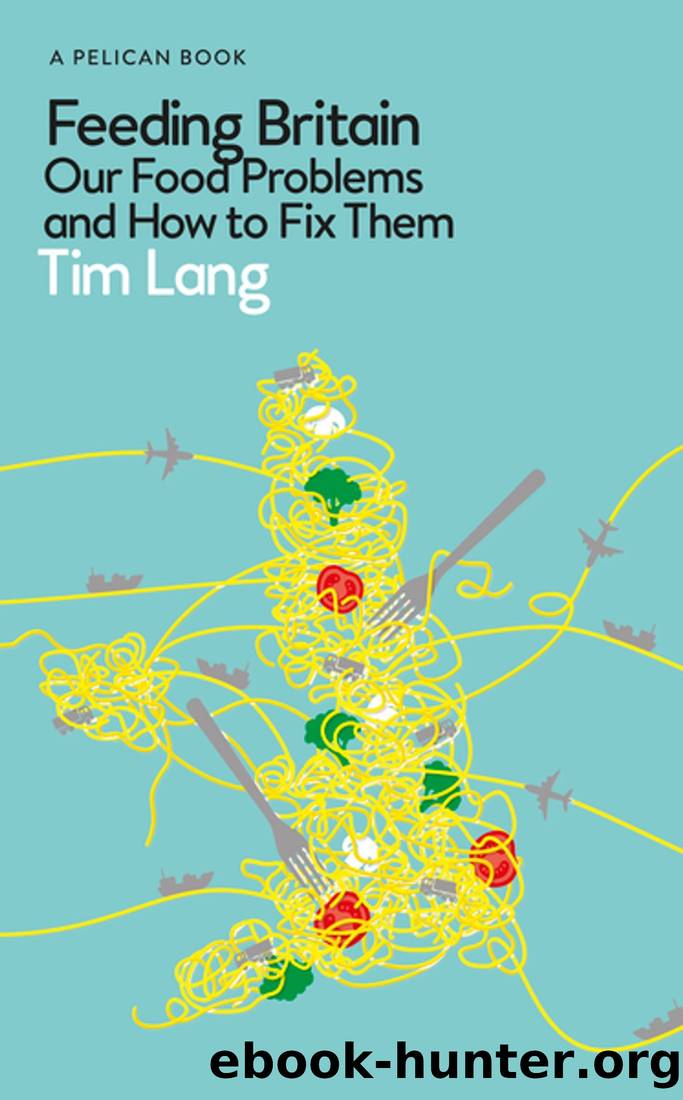Feeding Britain by Tim Lang

Author:Tim Lang [Lang, Tim]
Language: eng
Format: epub, azw3
ISBN: 9780241404812
Publisher: Penguin Books Ltd
Published: 2020-03-26T04:00:00+00:00
Food problem 7: Food waste is systemic
According to the Waste and Resources Action Programme (WRAP), the UK wastes over 10 mt of food after the farmgate or an average of 156 kg per person per year. Household food waste is 7.3 mt, estimated by WRAP as worth £15bn and emitting 22 mt of CO2e. Industry wastes 1.7 mt (worth £1.4bn), the hospitality sector wastes 0.9 mt, and retailers 0.25 mt.281 In 2017, the House of Commons Environment, Food and Rural Affairs Committee reported that 60% of this waste is avoidable, and the total worth of food waste is £13bn a year.282 By 2018, using the new international Food Loss and Waste Accounting and Reporting Standard (FLWS), WRAP estimated wasted food as worth even more, £20bn.283 However calculated, these are huge sums. Figure 4.15 provides an overview. About two thirds of UK food waste is directly by consumers and a third by supply chains. But we should not be complacent about relatively low industry waste figures. That it over-produces food makes waste inevitable. That pricing entices over-purchasing adds to it. That retail power pushes waste back down the chain – rejecting wonky vegetables, for instance, which are perfectly nutritious and sound – means no one is exempt from responsibility. We should not then be surprised that only half of all potatoes bought here, according to WRAP, get to be consumed.
Waste is rather like plastic in public discourse. Everyone now seems to be against it, yet it continues apace. UK consumers are locked in on both and cannot easily do the right thing unless the signals are right, systems are redesigned and behaviour changes. Consumers need help, not an undercurrent of blaming them in the first place.284, 285 Initially the government targeted consumers with ‘shock’ tactics, but latterly realized that waste was a systemic rather than an individualized failure; rightly it then started a more ‘shared responsibility’ approach.286 Then, following EU leadership, the UK adopted the language of the circular economy, which sees food waste as an economic opportunity. The problem is that a ‘tyranny of structurelessness’ can emerge where, if everyone is involved, and there is no firm government leadership, the framework slips into a voluntarist approach, or, worse, there is a fixation on only some parts of the problem (plastic straws rather than all plastic packaging).
Figure 4.15
UK food waste 2017, by sector, %
Source: WRAP. Estimates of food surplus and waste arising in the UK.281
Download
This site does not store any files on its server. We only index and link to content provided by other sites. Please contact the content providers to delete copyright contents if any and email us, we'll remove relevant links or contents immediately.
The Secret History by Donna Tartt(16605)
The Social Justice Warrior Handbook by Lisa De Pasquale(11485)
Thirteen Reasons Why by Jay Asher(7777)
This Is How You Lose Her by Junot Diaz(5747)
Weapons of Math Destruction by Cathy O'Neil(5027)
Zero to One by Peter Thiel(4815)
The Myth of the Strong Leader by Archie Brown(4783)
Promise Me, Dad by Joe Biden(4439)
Stone's Rules by Roger Stone(4409)
Beartown by Fredrik Backman(4399)
How Democracies Die by Steven Levitsky & Daniel Ziblatt(4391)
The Fire Next Time by James Baldwin(4336)
100 Deadly Skills by Clint Emerson(4069)
A Higher Loyalty: Truth, Lies, and Leadership by James Comey(4024)
Rise and Kill First by Ronen Bergman(4006)
The David Icke Guide to the Global Conspiracy (and how to end it) by David Icke(3874)
The Farm by Tom Rob Smith(3868)
Secrecy World by Jake Bernstein(3773)
The Doomsday Machine by Daniel Ellsberg(3725)
